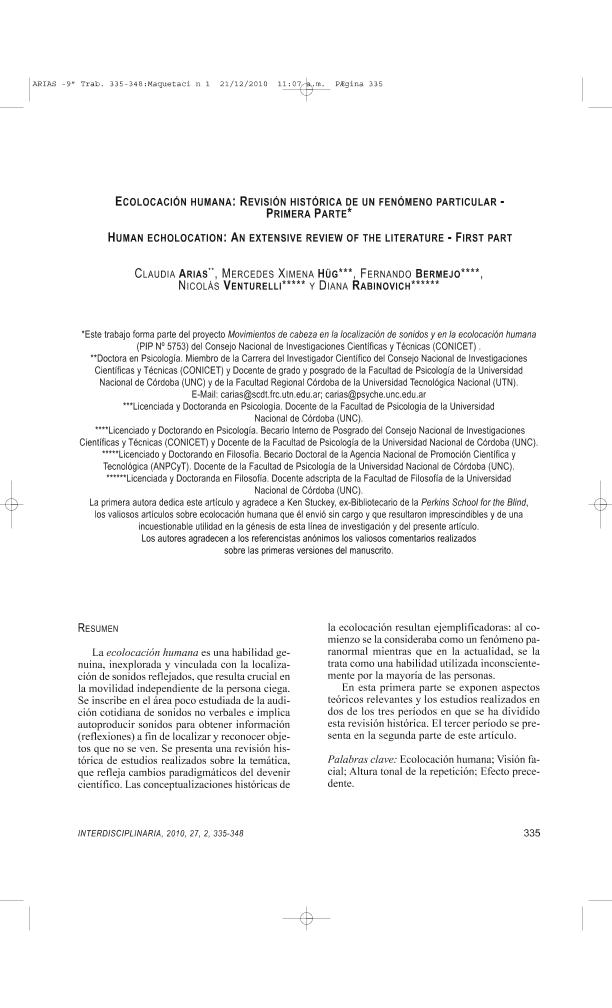Artículo
La ecolocación humana es una habilidad genuina, inexplorada y vinculada con la localización de sonidos reflejados, que resulta crucial en la movilidad independiente de la persona ciega. Se inscribe en el área poco estudiada de la audición cotidiana de sonidos no verbales e implica autoproducir sonidos para obtener información (reflexiones) a fin de localizar y reconocer objetos que no se ven. Se presenta una revisión histórica de estudios realizados sobre la temática, que refleja cambios paradigmáticos del devenir científico. Las conceptualizaciones históricas de la ecolocación resultan ejemplificadoras: al comienzo se la consideraba como un fenómeno paranormal mientras que en la actualidad, se la trata como una habilidad utilizada inconscientemente por la mayoría de las personas. En esta primera parte se exponen aspectos teóricos relevantes y los estudios realizados en dos de los tres períodos en que se ha divididoesta revisión histórica. El tercer período se presenta en la segunda parte de este artículo. Echolocation is a genuinely human though greatly unexploited ability that is closely related to the localization of reflected sounds. It is part of the scarcely studied and promising field of the percept-cognitive processes involved in everyday audition of non-verbal sounds. It implies self-producing sounds (original or direct signal) with the specific purpose of obtaining auditory information (reflected signal) to detect, locate and recognize unseen objects. This ability turns out to be crucial to the blind person's independent mobility, an aspect that is severely affected by blindness. We present an historical revision of the main studies that have been carried out on this particular phenomenon, describing the paradigm changes that occurred in scientific history. The historical conceptualizations of echolocation are specially revealing: while it was initially considered a paranormal phenomenon, a kind of sixth sense, now it is treated as an ability that could be unconsciously used by most of us. In this first part of this paper we present relevant theoretical aspects and the studies carried out during two of the three periods this historical revision has been divided in: (a) First approaches (1700 - 1935) and (b) Scientific study of human echolocation (decades from 40s to 80s). The third period, named recent studies, is developed in the second part of this article.
Ecolocación humana: Revisión histórica de un fenómeno particular - Primera parte
Título:
Human echolocation: An extensive review of the literature - First part
Arias, Claudia ; Hug, Mercedes Ximena
; Hug, Mercedes Ximena ; Bermejo, Fernando Raul
; Bermejo, Fernando Raul ; Venturelli, Alfonso Nicolás
; Venturelli, Alfonso Nicolás ; Rabinovich, Diana Luz
; Rabinovich, Diana Luz
 ; Hug, Mercedes Ximena
; Hug, Mercedes Ximena ; Bermejo, Fernando Raul
; Bermejo, Fernando Raul ; Venturelli, Alfonso Nicolás
; Venturelli, Alfonso Nicolás ; Rabinovich, Diana Luz
; Rabinovich, Diana Luz
Fecha de publicación:
12/2010
Editorial:
Centro Interamericano de Investigaciones Psicológicas y Ciencias Afines
Revista:
Interdisciplinaria
ISSN:
0325-8203
e-ISSN:
1668-7027
Idioma:
Español
Tipo de recurso:
Artículo publicado
Clasificación temática:
Resumen
Archivos asociados
Licencia
Identificadores
Colecciones
Articulos (CINTRA)
Articulos de CENTRO DE INVESTIGACION Y TRANSFERENCIA EN ACUSTICA
Articulos de CENTRO DE INVESTIGACION Y TRANSFERENCIA EN ACUSTICA
Articulos(CCT - CORDOBA)
Articulos de CTRO.CIENTIFICO TECNOL.CONICET - CORDOBA
Articulos de CTRO.CIENTIFICO TECNOL.CONICET - CORDOBA
Citación
Arias, Claudia; Hug, Mercedes Ximena; Bermejo, Fernando Raul; Venturelli, Alfonso Nicolás; Rabinovich, Diana Luz; Ecolocación humana: Revisión histórica de un fenómeno particular - Primera parte; Centro Interamericano de Investigaciones Psicológicas y Ciencias Afines; Interdisciplinaria; 27; 2; 12-2010; 335-348
Compartir



